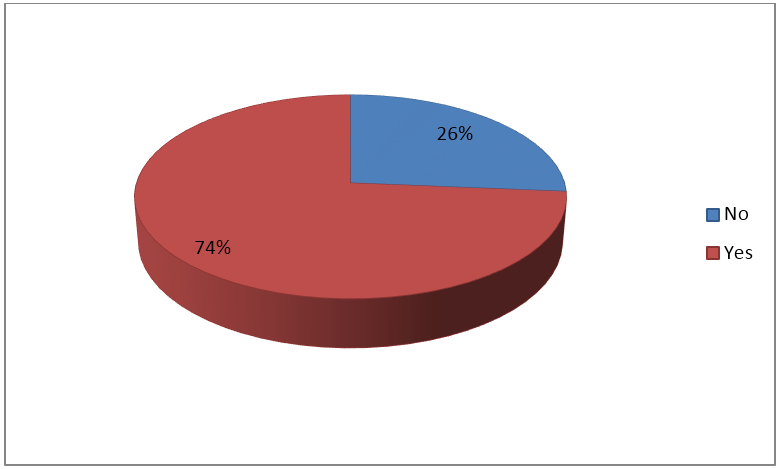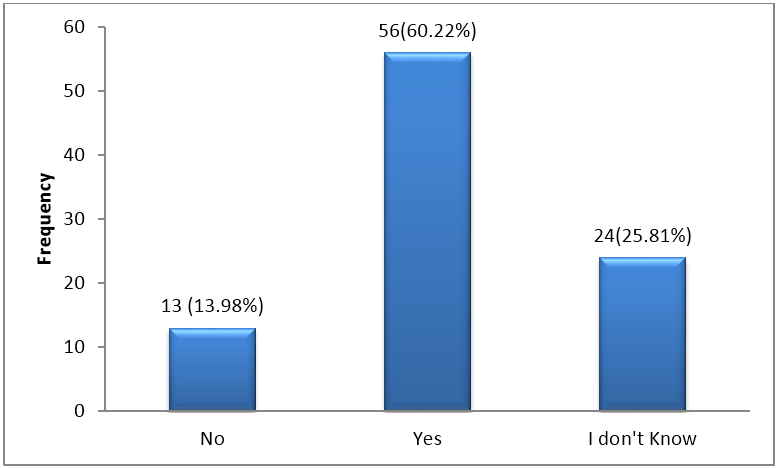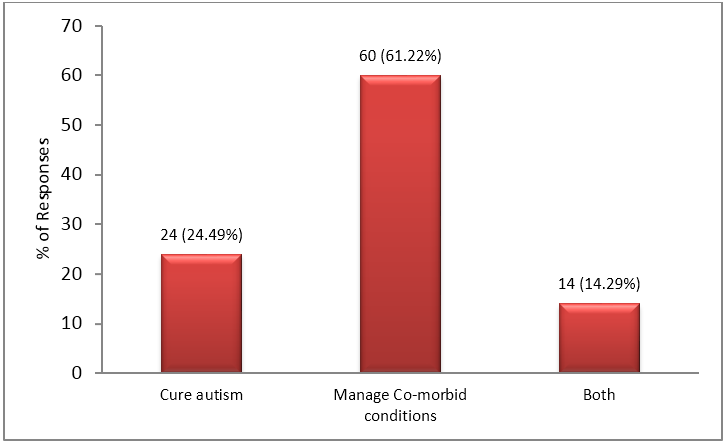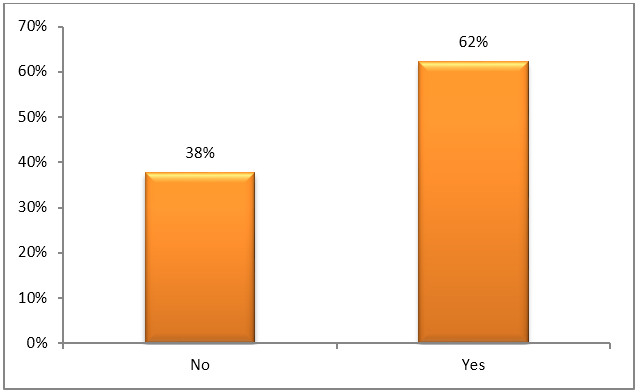Research Article
Volume 3 Issue 1 - 2018
Autism and Medication use Between Parents Willing and Worries
1Consultant Developmental and Behavioural Paediatrics, Department of Paediatrics, King Abdulaziz Medical City Riyadh, joint appointed Assistant Professor at King Saud bin Abdulaziz University for Health Sciences Riyadh Saudi Arabi
2General pediatrics Consultant, Department of Paediatrics, King Abdulaziz Medical City Riyadh, joint appointed Assistant Professor at King Saud bin Abdulaziz University for Health Sciences Riyadh Saudi Arabi
3Biostatistician,Department of Biostatistics,King Abdullah International Medical Research Center (KAIMRC)
2General pediatrics Consultant, Department of Paediatrics, King Abdulaziz Medical City Riyadh, joint appointed Assistant Professor at King Saud bin Abdulaziz University for Health Sciences Riyadh Saudi Arabi
3Biostatistician,Department of Biostatistics,King Abdullah International Medical Research Center (KAIMRC)
*Corresponding Author: Dr Abeer M Alharbi, Consultant Developmental and Behavioural Paediatrics, Department of Paediatrics, King Abdulaziz Medical City Riyadh, joint appointed Assistant Professor at King Saud bin Abdulaziz University for Health Sciences Riyadh Saudi Arabi.
Received: November 11, 2018; Published: November 26, 2018
Abstract
Abstract : Medications are used widley in treating autism this study was conducted to elaborate on parents knoweldge about maedications used on autism and to explore parents believes on the benefit of these medications to their children, inaddition to highlight on their worries and burden in using medication.
Method: A cross sectional study was conducted in Saudi Arabia,One hundred parent particpated and completed survey quesstionnaire assessing their knowledge as well as their worries in medication use for their autistic children.
Results: Indicated that there was 60% of participants believe on the benefit of medication while 62% were worrisome to use medication to their children.
Conculsion: Although majority of parents has various medications worries and concerns, they are willing to use medications to help their children overpass their challenges.
Keywords: Autism; Medication; Worries; Saudi Arabia
Introduction
Autism is a life long developmental disability characterized by weak social communication skills and language impairment combined with sterotype, repetitive behaviors [1]. In addition behavior and psychiatric problems such as attention deficit hyperactivity disorder, aggression and anxiety disorder are common in individuals with autism [2].
Majority of autistic individuals require medications to treat complex behavior problems, Lynn K., et al. 2013 found that around 30% to 60% of autistic children are being on one or more prescribed medication [3]. Treatments options for are variable including psychotherapy and psychopharamcolgy, for instance atypical antipsychotic medication has been used widely to reduce behavioral problem in autism disorders [4]. Risperidal Considerd as one of the atypical antipsychotic medication that has been approved by food and drug adminstration (FDA) and used extensively in autism [4]. The saftey and long term efficacy of atypical antipsychotic in treating challenging behaviors in individuals with autism were explored in Lynn K., et al. 2013 study [3].
Raising child with autism is considered as a hard mission for the parents, furthermore the descision to use medication for their children could be challenging, hold countless worries and this could be due to several factors including: inadequate drug information, fear of medication side effect and lack of evidence about medication efficacy on children [5], moreover researches measuring parents knoweldge and satisfaction in using medicatons to their children with autism are limited (Frances, 2005; Kasari, 2002; Lord., et al. 2005; Rogers & Vismara, 2008; Scahill &Martin, 2005; Volkmar, Lord, Bailey, Schultz, & Klin, 2004). In our practice in Saudi Arabia (SA), we found parents alttitude towards using medication.
Is similar to what was descibed in literature globally, parents are relactant to use Medication to their children with autism, lacking knoweldge and access to drug information, in addition to the fear of social stigma are common barriers in using medication. This observations had been noticed in other studies such as Metz., et al. (2005), determine in their study the factors affecting parents decisions in treatment plan [6]. Moreover parents choices on treatment plan were explored by Anne Bowker study (2011) [6].
In Saudi Arabia researches in autism are limited, further no studies were found addressing parents perception about medication use in children with autism as far as we Know, this is the first study conducted to addresses the problem from parents prespective. In addition, we are aiming to add evidence to our observation on this important topic.
Study aims to assess parents knoweldge and believes about medication use for their autistic children
- To assess parents knowledge about the medication use in autism
- To assess parents worries about using medciation
- To assess perception difference according to gender
- To assess compliance rate in medication use
Methods
Study design and participants
A cross sectional study was conducted in Riyadh, the capital of Saudi Arabia, Survey questionnaire were distributed to tertiary care hospitals with specialized autism clinics running on regular basis (King Abdullah specialized children hospital, King Fahad Medical City Military hospital). In addition to autism rehabtilation center and to Families attending community autism related activities during the month of April 2016 which corresponds to the international autism awareness month.
A cross sectional study was conducted in Riyadh, the capital of Saudi Arabia, Survey questionnaire were distributed to tertiary care hospitals with specialized autism clinics running on regular basis (King Abdullah specialized children hospital, King Fahad Medical City Military hospital). In addition to autism rehabtilation center and to Families attending community autism related activities during the month of April 2016 which corresponds to the international autism awareness month.
Parents and relatives of autistic children who were on medication (atypical antipsychotropic agents were included) to assess their knowledge about medication use on autism and elaborate on the factors interfere with their decision, inclusion criteria was both males and females, autistic children on medication, care given directly involved with child’s care and medication adminstration.
Measure
A Twenty three survey questions were developed by the authors in English and Arabic Languages to assess parents perception in medication use in autism, it was reviewed by biostation, Pharmasicit and experts who are working with autism patients, content and face validity were done, a self administered questionnaire were handed to the parents by clinical cordinators and volunteer. Questionnaire filled and returned back after 10 to 20 minutes.
A Twenty three survey questions were developed by the authors in English and Arabic Languages to assess parents perception in medication use in autism, it was reviewed by biostation, Pharmasicit and experts who are working with autism patients, content and face validity were done, a self administered questionnaire were handed to the parents by clinical cordinators and volunteer. Questionnaire filled and returned back after 10 to 20 minutes.
Survey questionnaire consisted of introductory cover page, consent form, followed by survey questionnaire which include 3 sections, the first section include questions related to demographic characteristic of the participants, (age, gender, martial-status, and educational level), the second section includes questions related to believes and worries relted to medication use and the third section covers questions related to compliance with medication used and satisfaction about drug information given to them as well as other drug information resources, all items are rated on a 3-point Likert scale1 as Yes, 2 as No and 3 as I don’t know.
Statistical analysis
Descriptive statistics for categorical data were displayed as number and percentage and mean ± Standard deviation (SD) or median ± Inter Quartile range (IQR) for continuous data. The group differences for categorical variables were assessed with Fisher's exact test or the Chi square test A P value of <0.05 was considered statistically significant. A statistical Analysis system version 9.4 was used for data analysis.
Descriptive statistics for categorical data were displayed as number and percentage and mean ± Standard deviation (SD) or median ± Inter Quartile range (IQR) for continuous data. The group differences for categorical variables were assessed with Fisher's exact test or the Chi square test A P value of <0.05 was considered statistically significant. A statistical Analysis system version 9.4 was used for data analysis.
Ethical Considerations
The proposal was approved by ethical board (IRB) at King Abdullah Reseach center (KAMRC) Participation in the study was voluntary, Informed consent provided to the study participants before data collection. All the data kept under lock and key, only the PI and co-PI will have access to it. The confidentiality and anonymity of the participants were kept all through out of the study and in the dissemination phase.
The proposal was approved by ethical board (IRB) at King Abdullah Reseach center (KAMRC) Participation in the study was voluntary, Informed consent provided to the study participants before data collection. All the data kept under lock and key, only the PI and co-PI will have access to it. The confidentiality and anonymity of the participants were kept all through out of the study and in the dissemination phase.
Results
Two hundred questionnaire were distributed to parents of autism spectrum disorders and 100 were returned (50% return rate). Majority of respondents were females (84%). The 32% of responders were from 31 years to 40 years old. In regard to educational level 59% has university degre and 21% has secondary education, Marital status 65% were married and 17% were singles. For more detail please refer Table 1.
| Total (N = 100) n ( %) | ||
| Gender | Male | 16 (16.0%) |
| Female | 84 (84.0%) | |
| Education | Uneducated | 3 (3.0%) |
| Primary | 9 (9.0%) | |
| Intermediate | 4 (4.0%) | |
| Secondary | 21 (21.0%) | |
| University | 56 (56.0%) | |
| Other | 7 (7.0%) | |
| Age (Years) | 19 or less | 12 (12.0%) |
| 20 - 30 | 19 (19.0%) | |
| 31 - 40 | 32 (32.0%) | |
| 41 - 50 | 27 (27.0%) | |
| Older than 50 | 10 (10.0%) | |
| Marital Status | Single | 17 (17.0%) |
| Married | 63 (63.0%) | |
| Divorced | 13 (13.0%) | |
| Widowed | 6 (6.0%) | |
| Income (Saudi Riyal) | less than 5000 | 23 (23.0%) |
| 5000-10000 | 32 (32.0%) | |
| More than 10000 | 38 (38.0%) | |
Table 1: Summary of Parent demographics.
The majority of parents had 74% of Compliance rate and adherance to medication . However, only 24% of parents could not adherence to medication due to unknown reasons. (Figure 1)
Out of 100 participants, 60% of paricipants had fair knoweldge about benefits and effect of medication, whereas 14% of participants believed to have no prior knowledge about it. There were 26% of particpicant who were not very sure about the benefits of medications (Figure 2).
The 61% believed that medication can be used to treat the comorbid conditions associated with autism while 25% believed that medication can cure autism. However, 14% believed in dual effect of the medication Figure 3.
More than half of the participants were worried to use medication to their children (Figure 4).
| Responses | autism medication considered to be psychiatric medication | Medication cause sedation | Medication cause addiction |
| No | 16 (16.16%) | 36 (37.11%) | 34 ( 34%) |
| Yes | 60 (60.61%) | 35 (36.08%) | 38 ( 38%) |
| I don't Know | 23 (23.23%) | 26 ( 26.8%) | 28 ( 28%) |
Table 2: Summary of Perception towards type of medication.
It is the evidence from the above table that majority of of participants 61% believed that autism as psychiatric medication whereas 16.2% had believed that it was not an psychiatric medication. There were 23% of participants who were not sure whether autism medication is psychiatric medication or not.
The majority of participants who believed autism as psychiatric medication had reported that these medication were not sedative or addictive in nature.
| Treatment adherence | P-value | ||||
| Response | Manage Comorbid conditions | Cure autism | Both | ||
| Parents worries | Yes | 35 (36.46%) | 16 (16.67%) | 8 (8.333%) | 0.8125* |
| No | 23 (23.96%) | 8 (8.333%) | 6 ( 6.25%) | ||
| Parents’ beliefs | Yes | 25 (25.77%) | 19 (19.59%) | 7 (7.216%) | 0.0104^ |
| No | 23 (23.71%) | 3 (3.093%) | 2 (2.062%) | ||
| I don't Know | 11 (11.34%) | 2 (2.062%) | 5 (5.155%) | ||
Table 3: Comparison of parents’ beliefs and worries with adherence to treatment.
^Fisher exact test was used to calculate p-value at 5% level of significance
*Chi square test was used to calculate p-value at 5% level of significance
^Fisher exact test was used to calculate p-value at 5% level of significance
*Chi square test was used to calculate p-value at 5% level of significance
There were 59 participants who expressed their worries about the adherence to treatment whereas, 37 participants were not worried about the treatment adherence. 35 out of 96 participants (36.5%) expressed their uncertainties whether medication can treat.
Co morbid conditions or not whereas 24% of participant had no concerns about it. 16% of participants had concerns if medication can cure austim whereas 8% of participants and no worries about it. There were only 8% of participatants who expressed their worries about the medication that it can treat both comorbidity and austim, while 6% of participants had not worries about it. However, the comparison between parent’s worries and treatment adherence was no statistical significant (p-value: 0.8125).
The 51 out of 97 participants belived to have treatment adherence whereas, 46 participants had no belief and 18 participants were not sure about it. The parents’ beliefs found to be statistically significant with treatment adherence (p-value:0.0104).
| Response | Gender | P-value | ||
| Female (N=84) | Male (N=16) | |||
| psychiatric medication | No | 14 (16.67%) | 2 ( 12.50%) | 0.7982^ |
| Yes | 49 (58.33%) | 11 (68.75%) | ||
| I don't Know | 20 ( 23.83%) | 3 ( 18.75%) | ||
| Missing | 1 | |||
| Cause Sedation | No | 28 (33.33%) | 8 (50.0%) | 0.2870* |
| Yes | 30 (35.71%) | 5 (31.25%) | ||
| I don't Know | 24 (28.57%) | 2 (12.50%) | ||
| Mising | 2 | 1 | ||
| Cause Addiction | No | 28 ( 33.33%) | 6 ( 37.50%) | 0.9365* |
| Yes | 32 ( 38.09%) | 6 ( 37.50%) | ||
| I don't Know | 24 ( 28.57%) | 4 ( 25.0%) | ||
| Missing | 0 | 0 | ||
Table 4: Comparison of Parents perception about autism medication by gender Consideration of autism medication.
^Fisher exact test was used to calculate p-value at 5% level of significance
*Chi square test was used to calculate p-value at 5% level of significance.
^Fisher exact test was used to calculate p-value at 5% level of significance
*Chi square test was used to calculate p-value at 5% level of significance.
The majority of female 58.3% (49/84) had perception that autism medications are psychiatric medication whereas 68.75% (11/16) of male agreed with them. However, there were no enough evidence statistically to support that gender and perception for autism as psychiatric medication had any association (P-value: 0.7982). The majority of male had perception that autism medication are not sedative in nature whereas majority of female had not agreed with male. We had again not enough evidence statistically to support that gender and perception about autism medication causes sedation had any association (P-value: 0.2870). The majority of female 38.09% had perception that autism medications are addictive in nature whereas male had not clear perception about it.
Discussion
This study was conducted to assess parents’ beliefs and worries about medications use to their children with autism.Results showed good response rate all over 77% and this could be explained by the attention given to autism over years by different medical and non medical sourses in the pupose of rasing knoweldge and awareness about autism. Majority of respondents were females 84% with more than half of participants had university education. Also this study found that 60% of the responders believed on the benefit of the medication and moreover around same percent 61% believe that medication were used to treat comorbid conditions more than it was used to cure autism 25% and these findings were consistant with previous studies.
A study by Zablotsky., et al. 2015 reported that 52.6% of parents using one medication or more to treat the comorbid conditions such as anxiety, attention deficit hyperactivity disorders and others [7,8]. Over all complianc rate and adherance to medication was 74% among study particpants although, more than half of the total sample indicated that they are worried to start medication to their children, the difference between parents worries and treatment adherence was statistical non-significant (p-value: 0.8125). Meantime the parents’ beliefs found to be statistically significant with treatment adherence (p-value:0.0104). Compliance and treatment adherence rate in our study was higher than what was reported in previous studies (Logan., et al. 2014) and this results might be explained because parents do not have many treatment options available.
In addition by comparing parents perception about autism medications by gender, study showed that female participants had higher rate of fears and concerns than male and this could be explained by the higher number of female particpants (84.0%) and this may considered as one of study limitation. Similar observation was noted in R Hock., et al. (2015) study [9] and this could be due to that mothers are the main caretaker of their autistic children. Also this study identifed many factors that raise parents distress and affect their decisions to treat their autistic children including, 60% of participant considered autism medications as one of the psychiatric medications, while 36.08% felt that medication use has sedative effect, moreover less than half of parents worried from the addiction that could result from austim medications (38%).
Thease results could reflect the lack of knoweledge and right drug information among parents of autistic individuals, yet these results support the findings reported by previous studies (Bowker., et al. (2010), Bashir., et al. 2014 ). Never the less a study by Schieve., et al. (2018) reported that parents of autistic children encounter a signifance stresses comparing to Parents of Children without Special health needs in which family centered treatment could be a valuable option for parents [10].
Lastly, autism is a complex disorder with unkown etiology and little evidence -based research conducted on exciting treatment options that impact negatively on parents and leave them overwhelmed and subsequently make their decisions on treating their children more harder (Kasari 2002). Further family centered research on the autism treatment should be conducted to add more Evidence and knoweldge about mysterious disorder. Study has several limitations First small sample size in which study results can’t be generalized, second Missing date that can affect the power of the study and third Female represent the majority of study sample which might be a selection bias. Further studies with bigger sample size, both gender are recommeded.
Conclusion
Parents of autistic children are often encounter many challenges through out their journey to raise their children, they have blend feelings between welling to do “looking for better” and worrries of wrong choice causing harm particulary in the absence of convincing evidence. Further researches should be conducted in the extent of parenting of children with special needs aiming to promote parents competence in decision making for their children treatments plan.
Acknowledgements
Authors acknowledges the support of Dr.Maha Alamari clinical phamascit and her team from pharmaceutical care department at King Abdulaziz Medical City in preparation study questionnaire.
Authors acknowledges the support of Dr.Maha Alamari clinical phamascit and her team from pharmaceutical care department at King Abdulaziz Medical City in preparation study questionnaire.
Conflicts of interest
The authors has no conflicts to declare. And no external fund was received
The authors has no conflicts to declare. And no external fund was received
References
- Kurzius-Spencer M., et al. "Behavioral problems in children with autism spectrum disorder with and without co-occurring intellectual disability". Research in autism Spectrum Disorders 56(2018): 61–71.
- Leyfer OT., et al. "Comorbid psychiatric disorders in children with autism: Interview development and rates of disorders". Journal of autism and Developmental Disorders 36.7 (2006): 849–861.
- Mathias JR, Dodd ME, Walters KB, Yoo SK, Erik A, Huttenlocher A. NIH Public Access. 33.11 (2010):1212–1217.
- DeFilippis M and Wagner KD. "Treatment of autism Spectrum Disorder in Children and Adolescents". Psychopharmacology Bulletin 46.2 (2016): 18–41.
- Bashir A, Qadri F. "Awareness and problems of parents of children with autism Spectrum Disorders". International Journal of Interdisciplinary Research And Innovations 2.2 (2014): 42–48.
- Bowker A., et al. "Treatments for autism: Parental choices and perceptions of change". Journal of autism and Developmental Disorders 41.10(2011): 1373–1382.
- Zablotsky B., et al. "Service and treatment use among children diagnosed with autism spectrum disorders". Journal of Developmental and Behavioral Pediatrics 36.2 (2015): 98–105.
- Dove D., et al. "Medications for Adolescents and Young Adults With autism Spectrum Disorders: A Systematic Review". Pediatrics 130.4 (2012): 717–726.
- Hock R., et al. "Examining treatment adherence among parents of children with autism spectrum disorder". Disability and Health Journal 8.3 (2015): 407–413.
- Schieve LA., et al. "The Relationship Between autism and Parenting Stress". Pediatrics 119 (Supplement 1) (2007): S114–121.
- http://www.raosoft.com/samplesize.html
Citation:
Abeer M Alharbi., et al. “Autism and Medication use Between Parents Willing and Worries”. Current Opinions in Neurological
Science 3.1 (2018): 604-612.
Copyright: © 2018 Abeer M Alharbi., et al. This is an open-access article distributed under the terms of the Creative Commons Attribution License, which permits unrestricted use, distribution, and reproduction in any medium, provided the original author and source are credited.


































 Scientia Ricerca is licensed and content of this site is available under a Creative Commons Attribution 4.0 International License.
Scientia Ricerca is licensed and content of this site is available under a Creative Commons Attribution 4.0 International License.